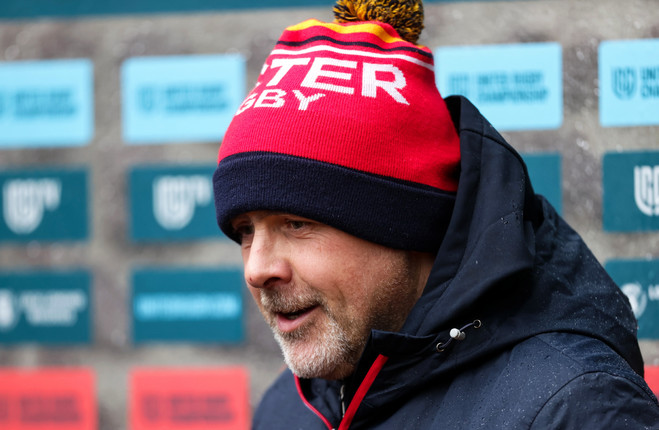THE UNITED RUGBY Championship’s head of match officials has said that Callum Reid’s late and potentially decisive disallowed try for Ulster in their narrow defeat to the Stormers on Saturday should have stood.
Tappe Henning admitted that the the process used by both Italian referee Gianluca Gnecchi and South African television match official Quinton Immelman in controversially chalking off the score was flawed, and said he had already spoken with Immelman twice in an attempt to understand the TMO’s interpretation of the incident.
Ulster thought they had earned an impressive, come-from-behind victory when replacement loosehead Reid burrowed over from close range to give the visitors a two-point advantage with two minutes remaining. However, as Billy Burns was lining up to take the conversion, Immelman intervened to ask referee Gnecchi to review replay footage in which Stormers back row Hacjivah Dayimani clearly dislodged the ball from Reid’s grasp before the Ulster player was able to conclusively touch the ball down.
Despite the fact that the ball clearly did not spill forward out of Reid’s hands, Gnecchi and Immelman agreed that it had been a knock-on by the Ulster player. Incensed Ulster skipper Alan O’Connor eventually convinced them to re-check the footage, insisting that in the process of his tackle, it had in fact been Dayimani who had knocked the ball forward — the most likely outcome from which would have been an Ulster advantage, in which case play would have continued and Reid would have scored regardless.
However, TMO Immelman stressed that Dayimani had hit not the ball, but Reid’s hands, and the officials stuck with their reviewed decision of an Ulster knock-on.
Post-match, Ulster boss Dan McFarland said of the decision: “I’ve got to be careful what I say here but I can’t understand why that’s not a try.
“If it’s not a try, then why is it a knock-on [against Ulster]? They deliberately knocked the ball out of our hands. I don’t get that.
“I’ll wait to hear what they have to say about it. In my head, we won that game, so we will move on.”
Speaking on the Final Whistle programme on South African TV channel SuperSport, the URC’s head of officials Henning agreed that Ulster could feel aggrieved with the verdict which denied them a fine victory in Cape Town.
“What’s hugely important here is that the referee’s awarded the try and it was during the process of taking the conversion kick that there was additional information now visible,” said Henning, a former referee who in the last decade has been referees commissioner in both Scotland and his native South Africa.
“So, now we’re looking for an infringement to overturn the referee’s original decision of ‘try’. During the conversion he had a look and there was no conclusive evidence that there was an infringement of a knock-on [by Ulster], so the decision stands.
There was no conclusive evidence that the Ulster player has knocked the ball on — and that’s the important bit: there has to be conclusive evidence that the ball goes forward from his hand in order to overturn the on-field decision. And that’s not there, and that’s why it is a try.
“The first bit of ‘on-field decision try’ was hugely important, which in the process that the boys followed… They didn’t actually revisit ‘on-field decision is try.’”
When asked what happens under his stewardship when officials make a costly error such as this one, Henning said: “We can’t change what happened and the scoreline can’t be changed, we all know that.
So, we have a remedial process: I’ve already had a chat with the TMO last night and this morning to review, and he needs to tell me what he did see and what his process was. We discuss with the referee what did he see, what was his process. And then I look for the flaws in the process and I advise and I help them, to say ‘the important things that you look at in this picture were this and this.’ Your focus needs to be on: a try was given, we’re now looking for conclusive evidence; you’re looking for an infringement [by Ulster] to say it’s no try. And that’s not there.
“So, our focus will be remedial. If it continues with poor calls from a referee or AR (assistant referee), then at some point we will not give them appointments in the top competition and we will then take them [down] to the next level to work with them, to upskill them to be better in their next performance.
“We look at the track record of the decision-making and if there is a track record of similar behaviours under pressure, then that’s when we will take them off. It’s not a numbers thing, it’s not like when a referee makes five mistakes, that’s when we act.
“I like to think of it as we put them in ICU and really focus on what they need to get better. That’s our process.”
This week on the Front Row – The42’s new rugby podcast in partnership with Guinness – panellist Eimear Considine makes a welcome return… and she’s brought her Ireland roommate, Hannah O’Connor, along too. They chat about broken noses, tanning routines, initiation songs and balancing the Women’s Six Nations with teaching, plus how one fan named her child after Ireland winger Beibhinn Parsons! Click here to subscribe or listen below:
The42 / SoundCloud

